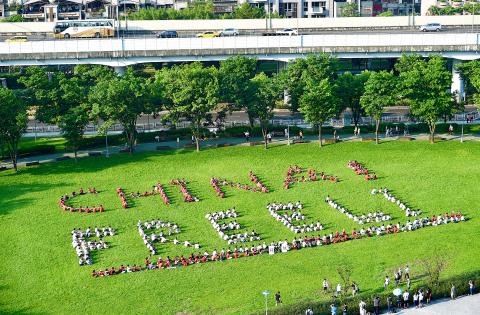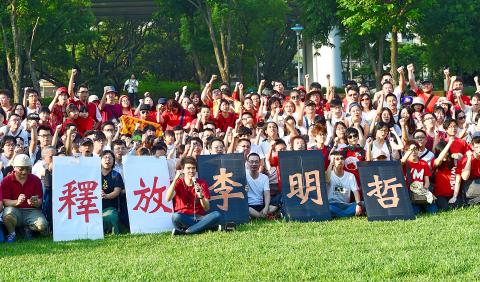Dozens of people rallied yesterday to spell out “China! Free Li” in Zhongyangyiwen Park (中央藝文公園) in Taipei and calling on Beijing to released Taiwanese human rights advocate Lee Ming-che (李明哲).
Lee went missing on March 19 after entering Zhuhai, China, from Macau. More than two months later the Chinese Ministry of State Security announced that he had been arrested on a charge of subversion of state power.
He was put on trial in Hunan Province on Monday last week and the court later released video footage of him confessing to attempting to subvert the Chinese government and accepting the charge against him.

Photo: Peter Lo, Taipei Times
Lee’s wife, Lee Ching-yu (李凈瑜), and human rights groups have been working since his disappearance to get Beijing to release him, and on Monday said that she did not recognize the validity of his trial.
Yesterday, civic groups that have been supporting Lee Ming-che gathered more than 250 supporters wearing red or white, who shouted “Freedom, not guilty! Democracy, not guilty! Release Lee Ming-che” as they formed the message “China! Free Li.”
Chen Fang-ming (陳芳明), a professor in the Graduate Institute of Taiwanese Literature at National Chengchi University, said that seeing the video of Lee’s confession reminded him of Chinese human rights lawyers detained by Beijing who have been forced to confess to various crimes.

Photo: Peter Lo, Taipei Times
“What’s the meaning of a rich and powerful state if its people cannot speak their minds? … China is an economic great power, but a dwarf in terms of human rights,” he said.
The Chinese government is unwilling to accept the universal values of freedom, democracy and civic rights that are common in Taiwan, he said.
Covenants Watch chief executive officer Huang Yi-bee (黃怡碧) said she and Taiwan Association for Human Rights secretary-general Chiu Ee-ling (邱伊翎) testified before the UN Human Rights Council’s Working Group on Enforced or Involuntary Disappearances in Switzerland on Wednesday about Lee Ming-che’s detention and trial.
She said the working group was very concerned about him and about his wife, worried that Lee Ming-che had confessed under severe mental pressure.
As he is being held on remand at an unknown location and Lee Ching-yu had previously been barred from freely entering China to see him, the Working Group agreed to continue investigating his case.
Chiu urged Taiwanese who criticized Lee Ching-yu to stop attacking, because their right to speak freely in Taiwan was fought for by human rights advocates like Lee Ming-che.
Judicial Reform Foundation executive director Kao Jung-chih (高榮志) said the Chinese government is trying to send the message that “if you step onto Chinese territory, we have control over you no matter where you come from,” and that its judicial system, which lacks the soul of the rule of law, is valid.
The groups said they will continue to air their protests to the world until Lee Ming-che is released.

CHAOS: Iranians took to the streets playing celebratory music after reports of Khamenei’s death on Saturday, while mourners also gathered in Tehran yesterday Iranian Supreme Leader Ayatollah Ali Khamenei was killed in a major attack on Iran launched by Israel and the US, throwing the future of the Islamic republic into doubt and raising the risk of regional instability. Iranian state television and the state-run IRNA news agency announced the 86-year-old’s death early yesterday. US President Donald Trump said it gave Iranians their “greatest chance” to “take back” their country. The announcements came after a joint US and Israeli aerial bombardment that targeted Iranian military and governmental sites. Trump said the “heavy and pinpoint bombing” would continue through the week or as long

TRUST: The KMT said it respected the US’ timing and considerations, and hoped it would continue to honor its commitments to helping Taiwan bolster its defenses and deterrence US President Donald Trump is delaying a multibillion-dollar arms sale to Taiwan to ensure his visit to Beijing is successful, a New York Times report said. The weapons sales package has stalled in the US Department of State, the report said, citing US officials it did not identify. The White House has told agencies not to push forward ahead of Trump’s meeting with Chinese President Xi Jinping (習近平), it said. The two last month held a phone call to discuss trade and geopolitical flashpoints ahead of the summit. Xi raised the Taiwan issue and urged the US to handle arms sales to

BIG SPENDERS: Foreign investors bought the most Taiwan equities since 2005, signaling confidence that an AI boom would continue to benefit chipmakers Taiwan Semiconductor Manufacturing Co’s (TSMC, 台積電) market capitalization swelled to US$2 trillion for the first time following a 4.25 percent rally in its American depositary receipts (ADR) overnight, putting the world’s biggest contract chipmaker sixth on the list of the world’s biggest companies by market capitalization, just behind Amazon.com Inc. The site CompaniesMarketcap.com ranked TSMC ahead of Saudi Aramco and Meta Platforms Inc. The Taiwanese company’s ADRs on Tuesday surged to US$385.75 on the New York Stock Exchange, as strong demand for artificial intelligence (AI) applications led to chip supply constraints and boost revenue growth to record-breaking levels. Each TSMC ADR represents

State-run CPC Corp, Taiwan (CPC, 台灣中油) yesterday said that it had confirmed on Saturday night with its liquefied natural gas (LNG) and crude oil suppliers that shipments are proceeding as scheduled and that domestic supplies remain unaffected. The CPC yesterday announced the gasoline and diesel prices will rise by NT$0.2 and NT$0.4 per liter, respectively, starting Monday, citing Middle East tensions and blizzards in the eastern United States. CPC also iterated it has been reducing the proportion of crude oil imports from the Middle East and diversifying its supply sources in the past few years in response to geopolitical risks, expanding